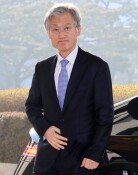Koreans Spend More, Foreigners Spend Less
Koreans Spend More, Foreigners Spend Less
Posted February. 09, 2007 06:46,
Mr. Choi, a team leader of a financial company, recently visited Japan to play golf for two days. During his golf tour, he spent 700,000 won total, including golf course, spa, and accommodation expenses. The cost was 30 percent lower than on his visit three years ago, which cost more than 1.0 million won, not including airfare.
Choi said, I benefited from the weak Yen. Now, 100 yen values 800won; it was 1,100 won three years ago.
The effect of the strong won causes Koreans and foreigners to spend in different ways. While Koreans are not reluctant to spend money overseas, foreign visitors in Korea are discouraged from spending due to higher consumer prices.
Strong won leads to rising prices-
Visa Korea said on February 8 that Japanese, who account for the largest share of visitors to Korea, spent $420.78 million in Korea in 2006, down 7.5% from 2005 ($455.10 million).
On the other hand, Koreans spent 251.16 million dollars in Japan in the same year, up 23.3% from 2005 ($237.5 million).
Koreans also spent more money in the United States, $1.05 billion in 2006, up 22.1% from the year earlier ($861.95 million). During the same period, U.S. visitors used their Visa cards to make $361.58 million in purchases, 11.4% higher than the year earlier ($203.75 million).
The Korean spending spree is coming from their currencys higher value.
In late 2006, the foreign exchange rate was 929.8 won to a dollar, 81.8 won lower than the rate in late 2005. The won/yen exchange rate also went down 73.11 won from 856.13 won against 100 yen to 783.02 won during the same period.
Lower currency rate makes foreigners feel price hikes in Korea-
100,000 yen was worth 856.6 thousand won in Korea late 2005, but its worth dropped to 783.02 thousand won due to the increasing value of won. Therefore, foreigners are feeling that Koreas prices are relatively high.
Tourism is the key to more revenues-
Experts agree that massive investment and deregulation in tourism are necessary to attract foreigners and Koreans alike.
They say the investment will help reduce ever-increasing travel deficits and boost economic growth by increasing employment and production. Choi Seung-dam, a Hanyang University professor in tourism, said, When we create an investment-friendly environment, such as revising the Seoul Metropolitan Area Readjustment Planning Act to allow developing large scale tourist complexes in the metropolitan area, we will be able to attract domestic and foreign tourists who now give the cold shoulder to Korea.
jinhup@donga.com kimsunmi@donga.com





![[천광암 칼럼]장동혁은 대체 왜 이럴까](https://dimg.donga.com/c/138/175/90/1/wps/NEWS/IMAGE/2026/02/22/133399127.1.jpg)

